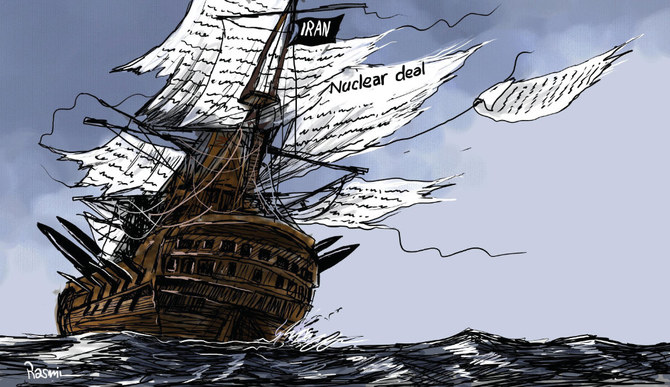
د. ماجد رفي زاده: يبدو أن النظام الإيراني ملتزم بالأسلحة النووية
Iranian regime appears committed to nuclear weapons
Dr. Majid Rafizadeh/Arab News/June 16/2022
The latest developments concerning Iran’s nuclear program indicate that the Tehran regime has most likely decided to go all-out to develop atomic weapons capability.
Firstly, although Supreme Leader Ali Khamenei continues to claim that his government does not have any interest in obtaining nuclear weapons and that Iran’s nuclear program was designed for peaceful purposes from the outset, several revelations show otherwise.
Some Iranian leaders have acknowledged that the regime’s nuclear program was always designed to manufacture atomic weapons. For example, former deputy speaker of the Iranian parliament Ali Motahari disclosed in April: “From the very beginning, when we entered the nuclear activity, our goal was to build a bomb and strengthen the deterrent forces but we could not maintain the secrecy of this issue.”
In addition, the former head of the Atomic Energy Organization of Iran, Fereydoon Abbasi-Davani, was the first Iranian official to admit that his work was part of a “system” designed to develop nuclear weapons. He said: “When the country’s all-encompassing growth began involving satellites, missiles and nuclear weapons, and surmounted new boundaries of knowledge, the issue became more serious for them.”
Secondly, if we closely examine the Iranian regime’s nuclear file, it becomes crystal clear that secrecy and clandestine activities have always been important elements of the regime’s nuclear program. If the Iranian nuclear program was truly set up for peaceful purposes, the country’s leaders would have declared all nuclear sites and received technological assistance, as outlined in the Non-Proliferation Treaty, to which Iran is still a party.
One of the most alarming issues is that, over recent months, the theocratic establishment has been restricting the ability of inspectors from the International Atomic Energy Agency to monitor its nuclear activities. Most recently, Iran has started to deactivate 27 cameras that help the IAEA monitor the regime’s nuclear activity. Just prior to this move, the authorities also turned off two UN surveillance cameras.
This comes at a critical time, when the Iranian regime has moved significantly closer to becoming a nuclear state. The IAEA last week acknowledged that Iran is only a few weeks away from having a “significant quantity of enriched uranium.” With this statement, the agency was referring to “the approximate amount of nuclear material for which the possibility of manufacturing a nuclear explosive device cannot be excluded.”
On top of this, the Iranian leaders continue to refuse to provide any explanation for its undeclared nuclear sites that have been identified by the IAEA. Director General Rafael Grossi warned: “We have to sit down urgently if possible to see how we continue with this. Iran has not provided explanations that are technically credible in relation to the agency’s findings at three undeclared locations in Iran.”
Secrecy and clandestine activities have always been important elements of the regime’s nuclear program.
In the past two decades, the only times the Iranian regime has reportedly slowed down or agreed to curb its nuclear advancement have been when drastic economic sanctions have been imposed. These threaten the hold on power of the ruling clerics, thus forcing the leadership to recalculate its political priorities. For example, the four rounds of UN sanctions imposed prior to the 2015 nuclear deal were significant because all five permanent members of the UN Security Council were on board. The sanctions endangered the ruling clergy’s grip on power and ultimately brought the Iranian leaders to the negotiating table between 2013 and 2015.
However, the unilateral US sanctions that are currently in place do not seem to be affecting the Iranian regime’s main source of revenue — oil exports — to such a significant level. The regime has been steadily exporting more oil over the last year and has now almost reached pre-sanctions levels. In fact, President Ebrahim Raisi, who took office last August, said in a live interview on state-run TV last month: “Oil sales have doubled. We are not worried about oil sales.” One important reason is that China has, despite the US sanctions, been buying a record amount of oil from Iran.
All the signs indicate that the Iranian regime appears to be going all-out for a nuclear weapon. If successful, this would have significant ramifications for peace and security in the Middle East and beyond. It is imperative that the international community acts immediately.
*Dr. Majid Rafizadeh is a Harvard-educated Iranian-American political scientist. Twitter: @Dr_Rafizadeh




















